
Annual Review of Financial Economics
Scope & Guideline
Synthesis of Theory and Practice in Finance
Introduction
Aims and Scopes
- Asset Pricing and Market Dynamics:
The journal extensively covers asset pricing theories, market behavior, and the implications of economic indicators on financial markets, including the effects of inflation and interest rates. - Behavioral Finance and Economic Decision-Making:
Research focusing on how psychological factors and behavioral biases influence economic decisions among households and investors is a critical area of the journal's scope. - Financial Market Structure and Regulation:
Studies pertaining to the structure of financial markets, regulatory frameworks, and their impact on financial stability are frequently addressed, as seen in discussions on banking crises and public discounting systems. - Innovations in Financial Technology:
The journal highlights the impact of technological advancements in finance, including discussions on fintech, decentralized finance, and algorithmic models that reshape traditional finance. - Sustainability and Social Responsibility in Finance:
A growing focus on climate finance, corporate social responsibility, and sustainable investing reflects the journal's commitment to addressing contemporary financial challenges and ethical considerations.
Trending and Emerging
- Impact of Macroeconomic Factors on Financial Markets:
Recent papers increasingly analyze how macroeconomic variables, such as inflation and fiscal policies, influence asset returns and overall market behavior, highlighting the interconnectedness of economics and finance. - Behavioral Insights into Financial Decision-Making:
There is a growing trend towards integrating behavioral economics into financial analysis, examining how cognitive biases and social factors affect investor behavior and market outcomes. - Integration of Technology in Finance:
The rise of fintech, including robo-advisors and blockchain technology, is increasingly prominent, reflecting a shift towards understanding how technological innovations disrupt traditional financial practices. - Sustainable Finance and Climate Risk:
Emerging themes around climate stress testing and sustainable investment strategies indicate a significant trend towards incorporating environmental considerations into financial decision-making. - Social Discount Rate and Intergenerational Equity:
A notable increase in research focused on the social discount rate highlights its relevance in policy discussions, particularly in the context of public finance and long-term economic planning.
Declining or Waning
- Traditional Banking Models:
Research specifically focused on traditional banking practices, such as the effects of interest rate changes on banking operations, has decreased as discussions shift towards nonbanking and alternative financing solutions. - Conventional Risk Management Strategies:
The exploration of standard risk management frameworks is less prevalent, as newer methodologies and technologies, such as machine learning and advanced analytics, gain attention. - Historical Financial Crises Analysis:
Although historical perspectives remain important, there has been a noticeable decline in studies centered solely on past financial crises, with a shift towards more proactive and forward-looking analyses of financial stability.
Similar Journals
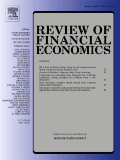
Review of Financial Economics
Advancing the Frontiers of Financial KnowledgeReview of Financial Economics, published by WILEY, stands as a prominent peer-reviewed journal in the fields of economics and finance. Established in 1994, this journal provides a platform for rigorous research and thoughtful discourse, contributing to the advancement of knowledge in financial theory and its applications. With an HIndex indicative of its citation impact, it ranks in the Q3 quartile for both Economics and Econometrics, as well as Finance, based on the 2023 categorization, underscoring its role in the academic community. Although it does not currently offer Open Access, the journal remains accessible to a wide audience through institutional subscriptions. Researchers, professionals, and students are encouraged to engage with its insightful articles that address contemporary issues and advancements within financial economics, fostering a deeper understanding of the complex interplay between economic systems and financial markets.
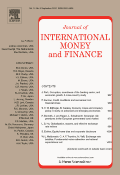
JOURNAL OF INTERNATIONAL MONEY AND FINANCE
Connecting scholars to the pulse of global monetary systems.JOURNAL OF INTERNATIONAL MONEY AND FINANCE is a premier scholarly publication dedicated to advancing the understanding of international finance and monetary economics. Published by Elsevier Science Ltd, this esteemed journal has been disseminating critical research since its inception in 1982 and will continue to contribute to the field through 2024. With a strong international presence and headquarters in the United Kingdom, the journal boasts an impressive collection of articles that explore significant trends, challenges, and innovations in the areas of economics and finance. Recognized for its impact, it ranks in the top quartile (Q1) in both the Economics and Econometrics and Finance categories as of 2023, signifying its influence and relevance among peers. Researchers, professionals, and students in these disciplines can benefit from the journal's rigorous peer-review process, ensuring high-quality scholarly outputs. Though not currently an open-access journal, it provides various subscription options to foster access to groundbreaking research in the financial ecosystem.
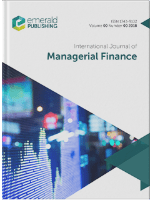
International Journal of Managerial Finance
Elevating the discourse in global finance research.The International Journal of Managerial Finance is a leading academic journal published by Emerald Group Publishing Ltd, dedicated to advancing the field of finance through rigorous research and scholarly discourse. Its ISSN is 1743-9132, with an E-ISSN of 1758-6569. Since its inception in 2005, the journal has provided valuable insights and frameworks that bridge theory and practice in managerial finance, making it an essential resource for researchers, professionals, and students alike. With its current standing at Q2 in both Business, Management and Accounting and Finance categories for 2023, and impressive Scopus ranks that place it in the 70th and 68th percentiles respectively, the journal is recognized for its high-quality contributions to the field. Though it does not currently offer open access, the rigorous selection process ensures that published articles are of the highest academic standard, providing a platform for significant discussions around contemporary issues in finance and management. The International Journal of Managerial Finance continues to play a pivotal role in shaping the discourse within the financial sector, fostering knowledge that is instrumental for effective managerial decision-making.
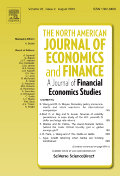
North American Journal of Economics and Finance
Advancing the frontiers of economic thought.The North American Journal of Economics and Finance is a premier academic journal published by Elsevier Science Inc. since 1992, dedicated to advancing the field of economics and finance through rigorous research and scholarship. With an impressive impact factor and recognition in the Q2 category for Economics and Econometrics and Q1 for Finance as of 2023, this journal holds a significant position in the academic community, ranked #41 out of 317 in Finance and #100 out of 716 in Economics. The journal features high-quality, peer-reviewed articles that cover a broad range of topics, from theoretical frameworks to empirical analyses and practical applications. Though not an open-access platform, the journal provides valuable insights for researchers, practitioners, and students alike, promoting knowledge dissemination in the dynamic landscape of economic and financial studies. With its commitment to excellence, the North American Journal of Economics and Finance serves as an essential resource for those seeking to deepen their understanding of contemporary issues in these critical fields.
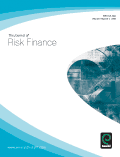
Journal of Risk Finance
Empowering research for informed financial decisions.The Journal of Risk Finance, published by Emerald Group Publishing Ltd, is a premier academic journal dedicated to advancing the understanding of risk management and finance practices since its inception in 1999. With a strong foothold within the Q2 rankings in both Accounting and Finance categories, it proudly holds a significant place in the scholarly landscape, ranking #54 out of 317 in the Scopus Economics and Finance category, placing it in the 83rd percentile. The journal aims to facilitate the exchange of innovative research and practical insights, catering to an audience of researchers, professionals, and students eager to explore contemporary issues in risk finance. While not an open access journal, it provides numerous access options, ensuring that essential findings reach a broad readership. Set in the United Kingdom and covering publications up to 2024, the Journal of Risk Finance continues to be an indispensable resource for those committed to this critical field.

Pacific-Basin Finance Journal
Navigating Economic Dynamics in the Pacific RegionPacific-Basin Finance Journal is a prestigious academic journal that focuses on critical developments and innovative research within the fields of finance and economics, specifically tailored to the Pacific region's unique economic landscape. Published by Elsevier, the journal boasts an impressive impact factor and is categorized in the Q1 quartile for both Economics and Econometrics and Finance as of 2023. This indicates its high relevance and position among the top journals in its field, with Scopus rankings reflecting a strong standing in the competitive landscape of finance research, holding the 45th position out of 317 in Finance and the 108th in Econometrics. Established in 1993, the journal is committed to disseminating rigorous theoretical and empirical research findings that enhance the understanding of financial systems in the Pacific Basin. Although the journal is not open access, it provides invaluable insights and comprehensive studies aimed at professionals, researchers, and students alike, fostering a deeper comprehension of the region's economic dynamics and global interconnectedness.

International Review of Finance
Unveiling the complexities of finance and economics.International Review of Finance is a prestigious academic journal published by Wiley, located in the United Kingdom. With its ISSN 1369-412X and E-ISSN 1468-2443, this journal serves as an essential platform for researchers and practitioners in the fields of Economics and Finance. Ranked in the Q2 quartile for both Economics and Econometrics and Finance as of 2023, it showcases high-quality research that contributes significantly to theoretical and practical advancements. Reflecting its standing, the journal is positioned in the 61st percentile in Economics and Econometrics and the 60th percentile in Finance according to Scopus rankings. The scope of the journal includes a diverse range of topics, encouraging innovative discourse across various financial disciplines. Although it does not offer open access, the International Review of Finance continues to be an important resource for academics, professionals, and students seeking to deepen their understanding of evolving financial theories and practices.
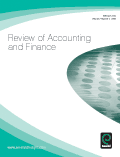
Review of Accounting and Finance
Elevating Academic Discourse in Financial StudiesReview of Accounting and Finance, published by EMERALD GROUP PUBLISHING LTD, is a prestigious academic journal with a longstanding commitment to advancing scholarship in the fields of accounting, finance, and economics. With an ISSN of 1475-7702 and E-ISSN of 1758-7700, this journal has established itself as a key resource for researchers, professionals, and students seeking robust empirical and theoretical insights. It enjoys a strong reputation, reflected in its 2023 Scopus rankings, where it is positioned in the top quartile for Economics and Finance, and holds a Q2 category in Accounting. The journal covers a wide range of topics, aiming to foster discussion and disseminate knowledge that bridges the gap between theory and practice. Although it does not offer open access, its comprehensive scope is invaluable for those dedicated to understanding the complexities of financial systems and accounting practices from a global perspective. Published continuously from 2002 to 2024, the Review of Accounting and Finance is an essential outlet for innovative research that drives the discipline forward.

Intelligent Systems in Accounting Finance & Management
Transforming financial landscapes through intelligent insights.Intelligent Systems in Accounting, Finance & Management is a leading journal published by John Wiley & Sons Ltd, recognized for its commitment to advancing knowledge and research in the intersection of artificial intelligence and financial decision-making. With an ISSN of 1055-615X and an E-ISSN of 1099-1174, this journal serves as a vital resource for academics, practitioners, and students interested in the innovative applications of intelligent systems within the realms of accounting, finance, and management. Although it operates under traditional access options, the journal features a wide range of high-quality peer-reviewed articles designed to enhance understanding of complex financial environments and promote effective decision-making through technology. Its editorial standards ensure impactful research that resonates within both theoretical and applied contexts, making it an essential publication for those dedicated to furthering the field of financial intelligence systems.

EMERGING MARKETS FINANCE AND TRADE
Driving Research on Trade Trends and Economic PoliciesEmerging Markets Finance and Trade is a leading academic journal published by Routledge Journals, Taylor & Francis Ltd, specializing in the dynamic field of finance and trade within emerging markets. This journal boasts an impressive impact factor and ranks in the top quartiles of its categories, attaining Q1 status in Economics, Econometrics and Finance (miscellaneous) and Q2 in Finance as of 2023. With a strong focus on innovative research, it publishes cutting-edge studies and insights that are crucial for understanding the complexities of financial systems in emerging economies. The journal, with ISSN numbers 1540-496X and 1558-0938 for its electronic version, offers a platform for both established researchers and newcomers in the field, highlighting the latest trends, policies, and challenges in finance and trade from 2002 to 2024. While it maintains a subscription-based access model, its significant contributions make it a must-read for academics, professionals, and students alike who seek to navigate and influence the rapidly evolving landscape of emerging markets.